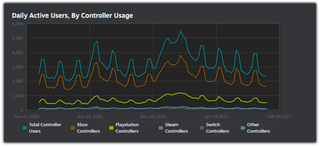48 million players use controllers on Steam
Ten percent of daily sessions are now on a pad of some kind.

In a recent developer announcement about Steamworks tools, Valve gave some insight into the number of players using controllers on Steam, which is higher than ever and rising. "48 million players have used a controller in a game on Steam," writes Valve, with about 10 percent of daily game sessions being played with a controller."
Naturally these figures vary wildly across genre: for RTS games that figure is "frequently below 1 percent" whereas "many sports and fighting games see over 70 percent of sessions played with a controller, while racing and skating games can easily have over 90 percent of players using a controller." Third-person action games, your Assassin's Creeds and so on, fluctuate between 40-50 percent of players using controllers, while for FPSs it's "solidly in the range of 7-8 percent."
The interesting aspect of this developer update beyond the figures (such as the fact controller usage on Steam has doubled in the last two years) is that Valve is better-informing developers about the tools Steam offers to customise controller support (beyond using the built-in API). That is, Valve believes these figures show that more PC developers need to take controller support more seriously: "in general, a lot of players like to play a large cross section of games on Steam with a controller—which is something many people, including those of us at Valve, find a bit surprising."
The report then offers what Valve describes as "a fairly typical graph" showing the controller breakdown among users.

Here, Valve notes, around 21 percent of players are using PlayStation controllers while "the global average is 24 percent" (which is impressive, considering two years ago it was at just over 10 percent).
The report does not provide the global average for Xbox controllers, but in the above "typical example" of usage, 68 percent of users are on Xbox pads and Valve describes this as "pretty common for a lot of games." This is obviously beermat maths, but Valve's figures suggest more than triple the number of PC players are using Xbox pads than PlayStation.
Bringing up the rear in Valve's example breakdown are the Switch Pro Controller (4 percent) and Steam's own pad (2 percent) with "other controllers" accounting for 4 percent. Bear in mind that's data which Valve says is typical, not the global averages as in the case of PlayStation controllers.
The biggest gaming news, reviews and hardware deals
Keep up to date with the most important stories and the best deals, as picked by the PC Gamer team.
Valve's message to developers comes through pretty clear: Most games that are being played with a PlayStation controller on Steam are currently using Steam's default input services. Valve thinks there's room for better developer support in this area, and that this will encourage users who want to use that hardware—it says so directly by ending the report with this recommendation:
"If we have just one thing we’d suggest and promote, it would be for more developers to display the corresponding PlayStation icons in game when there is a prompt for a player to hit a certain button. You can make your own or you can use the icons already provided with the Steam Input API integration."
Valve has a point: Xbox prompts when you're using a PlayStation controller are damn annoying. Either way expect Steam support for modern controllers to keep getting better and better which, with hardware like the PS5's DualSense, is nothing but good news for PC gamers.
Rich is a games journalist with 15 years' experience, beginning his career on Edge magazine before working for a wide range of outlets, including Ars Technica, Eurogamer, GamesRadar+, Gamespot, the Guardian, IGN, the New Statesman, Polygon, and Vice. He was the editor of Kotaku UK, the UK arm of Kotaku, for three years before joining PC Gamer. He is the author of a Brief History of Video Games, a full history of the medium, which the Midwest Book Review described as "[a] must-read for serious minded game historians and curious video game connoisseurs alike."
Most Popular






